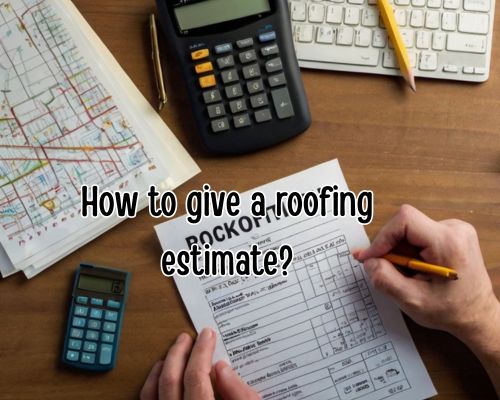
How to Give a Roofing Estimate in New Jersey: A Complete Guide for Local Contractors
Introduction: Why Accurate Roofing Estimates Matter in New Jersey 🏡
If you’re a roofing contractor in New Jersey, knowing how to give a roofing estimate that’s transparent, competitive, and professional isn’t just good business—it’s essential. With unpredictable weather conditions across counties like Middlesex, Bergen, and Ocean, and the demand for durable roofing materials such as asphalt shingles or metal panels, a precise estimate sets the stage for trust, project efficiency, and long-term client satisfaction.

Whether you’re estimating a basic roof repair in Newark or a full roof replacement in Cherry Hill, your estimate needs to include the right metrics, materials, local compliance factors, and labor breakdown. With Charles Jimerson of CJ Commercial Roofing NJ, let’s walk through the process step-by-step.
Step 1: Start With a Detailed Roof Inspection 🔍
Before you even think about numbers, conduct a thorough roofing inspection. This means physically getting on the roof or using drone technology to assess:
- The total square footage
- The current roofing material condition
- The pitch or slope of the roof
- Flashing and gutter issues
- Any structural damage or moisture problems
In regions like Princeton or Toms River, ice damming and hurricane-force winds are seasonal threats—meaning clients want estimates that account for durability and weather resilience. Include photos or video evidence when possible to support your findings and to boost your credibility.
Step 2: Measure Roof Size and Pitch Accurately 📐
Your roofing estimate will hinge heavily on accurate roof dimensions. Use a square footage roofing calculator, or measure manually. Don’t forget to account for roof complexity:
- Gable vs. hip roofs
- Dormers, valleys, and skylights
- Pitch adjustments (steeper = more labor)
In New Jersey, the average residential roof is about 1,700–2,000 sq ft, but older homes in places like Trenton or Montclair might have irregular roof lines. Be precise to avoid costly miscalculations later.
Step 3: Factor In Material Costs 🧱
List materials line-by-line in your estimate. Most clients will appreciate clarity over ambiguity. Include:
- Asphalt shingles (standard in most of New Jersey)
- Underlayment and vapor barriers
- Flashing and ventilation materials
- Drip edges
- Nails, sealants, fasteners
Provide options: for example, offer a good–better–best layout with 3-tab shingles, architectural shingles, and metal roofing. This helps homeowners in counties like Monmouth or Essex choose based on budget and preference.
Tip: Local supplier prices vary. Check vendors in Paterson, Elizabeth, or Jersey City for real-time material costs to keep your estimates competitive and current.
Step 4: Labor, Equipment, and Permit Costs 🧰
Labor is typically the largest variable. In New Jersey, roofing labor can range from $150 to $300 per square (100 sq ft), depending on roof complexity and crew experience.
Include:
- Labor hours & crew size
- Equipment rentals (dumpsters, lifts, scaffolding)
- Disposal fees for old materials
- Safety precautions (especially for steeper roofs)
Also account for permits. Municipalities like Newark or Hoboken often require documentation for roofing jobs over a certain size. Always check the local building code and include permit application fees in your quote.
Step 5: Include Warranty and Insurance Info 📄
Clients in New Jersey are savvy—they want guarantees. Your estimate should detail:
- Workmanship warranties (5–10 years standard)
- Manufacturer warranties (for shingles or other materials)
- Proof of liability insurance and workers’ comp coverage
Bonus: Mentioning that you’re fully licensed and insured in NJ helps your estimate stand out, especially for first-time homeowners in growing towns like Edison or Hamilton Township.
Step 6: Add Timeline and Payment Terms 🕒💳
Time is money. Lay out a realistic project schedule:
- Start and end date
- Contingency for weather delays (rain or snow is common in northern NJ)
- Clean-up and final inspection timeline
Be crystal clear about payment terms. Most roofing contractor in New Jersey use a schedule like:
- 30% deposit
- 40% midpoint payment
- 30% upon completion
Use invoicing software or template PDFs with your logo, license number, and contact details for a professional touch.
Step 7: Make Your Estimate Customer-Friendly ✍️
Clients aren’t just buying a roof—they’re buying confidence. Here’s how to package your roofing estimate for maximum clarity and impact:
- Use plain language (avoid technical jargon)
- Include a summary page with the total estimate
- Use bullet points, bold headers, and color-coded sections
- Attach before/after project photos (if applicable)
New Jersey homeowners appreciate straight talk and thorough documentation. Offer to explain any part of the quote during a walk-through or Zoom call.
Bonus: Use Local SEO in Your Estimate Template 🌐
Whether you’re marketing in Somerset County or Atlantic City, ensure your digital estimate includes location-relevant keywords like:
- “Affordable roofing estimates in New Jersey”
- “Roof replacement quote in Newark”
- “Licensed roofing contractors in Bergen County”
- “How much does a new roof cost in NJ?”
This helps your business show up in Google local pack listings and builds trust via local familiarity.
Final Thoughts: Giving Roofing Estimates That Win Clients in NJ 💼🏠
Mastering how to give a roofing estimate is about more than just crunching numbers—it’s about trust, precision, and local expertise. In New Jersey’s competitive roofing industry, the contractors who go beyond the basics—those who provide transparent, detailed, and region-specific estimates—will consistently win more business.
If you want to stay competitive across Passaic, Union, or even down near Cape May, get your estimates dialed in. With the right approach, you won’t just be fixing roofs—you’ll be building a bulletproof reputation.


